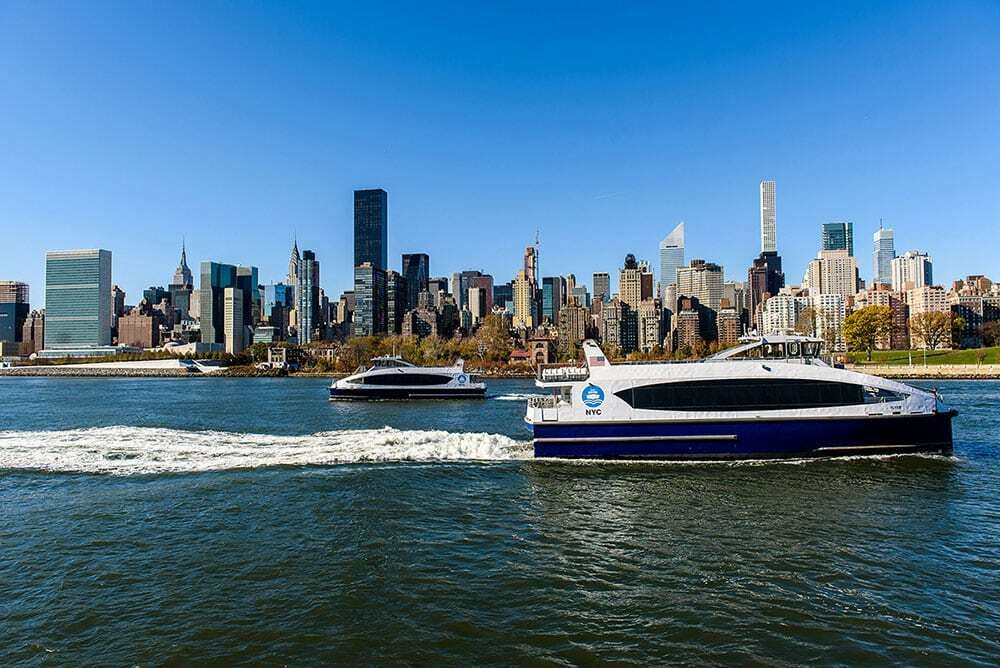M&T Bank And Carver Federal Savings Launch Harlem Multicultural Business Lab
The #1 source in the world for all things Harlem.
In an exciting collaboration, M&T Bank and Carver Federal Savings Bank in Harlem have officially launched the Harlem Multicultural Small Business Lab, marking a significant milestone for the vibrant entrepreneurial community. The innovative initiative was unveiled on March 30th, 2023, showcasing the commitment of both banks to empower and support small businesses in Harlem and…
The post M&T Bank And Carver Federal Savings Launch Harlem Multicultural Business Lab appeared first on Harlem World Magazine.
The NYC Ferry is making it easier to get to Rockaway this summer

The increased temps are coming in the next few weeks, which means New Yorkers will be looking for some much-needed reprieve at local beaches—luckily for us, the NYC Ferry just announced it’s making it easier to get to one of the city’s most popular ones.
Starting Saturday, July 1, NYC Ferry will expand weekend and holiday service to Rockaway Beach, including adding an extra vessel along the busy route to increase rider capacity by 25%. (Use the NYC Ferry app to view updated schedules.)
And if you’ve taken the ferry in recent years, you know how long and winding those queues can get when boarding at Wall Street’s Pier 11, so you can secure your place on the beach-bound boat by purchasing reserved tickets on any weekend Rockaway trips from 9am to 2pm, with a return to Manhattan between 3pm and 8pm.
Reserved tickets can be bought in the NYC Ferry app for up to 2 weeks before the date of your departure, and cost $10 as opposed to the ferry’s regular fares: $4 single trip, $2.75 as part of the 10-pack or the $1.35 discount for seniors, people with disabilities, and New Yorkers living at or below the federal poverty line. The Rockaway Reserve option will run until Monday, September 4.
“There’s no better place to be than Rockaway in the summertime,” Queens Borough President Donovan Richards said in a statement. “Better utilizing our waterways is both smart, climate-friendly policy and the most enjoyable trip our transit system can offer.”
This summer will also see the return of the convenient “Rockaway Rocket,” a reservations-only express ferry that goes straight to the Rockaways, though this year it has a new departure point. The limited-time route will run between Brooklyn Bridge Park Pier 6 (Atlantic Avenue) and the Beach 108th dock in Rockaway, Queens, for four weekends from Saturday, August 12 through Labor Day. Tickets will cost ten bucks and a final schedule will be released in the coming weeks.
“After the success of last year’s Rockaway Rocket, we are excited to be bringing new and additional improvements for beachgoers and regular riders this summer,” said New York City Economic Development Corporation President and CEO Andrew Kimball said in a statement. “These two new pilot programs are designed to make the entire NYC Ferry system more enjoyable, accessible, and efficient. As ridership continues to break records, it’s clear New Yorkers are endorsing the NYC Ferry Forward vision to create a more accessible, equitable and fiscally sustainable ferry system.”
#TheGramUptown: Greetings From Planet Uptown
We invite you to subscribe to the weekly Uptown Love newsletter, like our Facebook page and follow us on Twitter & Instagram or e-mail us at UptownCollective@gmail.com.
The post #TheGramUptown: Greetings From Planet Uptown first appeared on Washington Heights, Inwood & Harlem Online | The Uptown Collective.
NYC SBS Releases Inaugural Report: Empowering Small Businesses In An Opportunity-Filled City
The #1 source in the world for all things Harlem.
The Department of Small Business Services (SBS) in New York City has unveiled its inaugural report from the NYC Small Business Advisory Commission (SBAC). Presenting a comprehensive set of recommendations to establish New York City as a “City of Yes” for small businesses. The SBAC, established through Executive Order 15 by Mayor Eric Adams, serves…
The post NYC SBS Releases Inaugural Report: Empowering Small Businesses In An Opportunity-Filled City appeared first on Harlem World Magazine.
Planning A Fireworks Display? Here’s How To Stay Safe So You Don’t End Up In Harlem Hospital
The #1 source in the world for all things Harlem.
Fourth of July usually means big-time sales and trips to get away for a long weekend. And for many Harlemites, it also means fireworks. While fireworks are fun and provide great entertainment on warm summer nights, they also come with a great deal of injury risk. According to the Consumer Product Safety Commission’s 2022 Fireworks Annual Report, there were 11…
The post Planning A Fireworks Display? Here’s How To Stay Safe So You Don’t End Up In Harlem Hospital appeared first on Harlem World Magazine.
Affirmative action is out in higher education. What comes next for college admissions?

Colleges across the country will be forced to stop considering race in admissions under Thursday’s Supreme Court ruling, ending affirmative action policies that date back decades.
Schools that have relied on race-conscious admissions policies to build diversity will have to rethink how they admit students. It’s expected to result in campuses that have more white and Asian American students and fewer Black and Hispanic students.
The impact of the decision will be felt most strongly at the nation’s most selective colleges, which have been more likely to consider race as one of many factors in admissions. But some less selective universities also consider race, and hundreds of colleges may need to adjust their admissions systems in response to the decision.
Colleges say they’re still analyzing the decision, but it’s sure to have a dramatic impact nationwide. Here’s what we know so far.WHEN WILL THE RULING TAKE EFFECT?
Today’s incoming high school seniors will be the first to see any change. Many of them will be applying for college over the next year as colleges remove race from admissions decisions. The process probably won’t look much different for students — maybe there will be another question or two about their life experiences — but behind the scenes, there could be big changes in the way colleges evaluate applications.
At Northeastern University, President Joseph E. Aoun said in a campus message the decision “will dramatically alter the use of race as a factor in college admissions.”HOW MANY COLLEGES CONSIDER RACE?
No one knows for sure. Colleges aren’t required to disclose whether they consider race, and the federal government doesn’t track it. A survey of about 200 colleges in 2019 found that roughly four in 10 colleges said race had at least limited influence in admissions decisions. The practice is most common at highly selective institutions, while many less selective schools don’t consider race.
Nine states have separately banned affirmative action at private universities, including California, Michigan, Florida and Washington.
In states that already banned affirmative action, colleges responded by recruiting more low-income students, hoping that wealth would act as a proxy for race. Some colleges also started “percentage” plans that offer admission to top students at every high school in their state. Such approaches have had mixed results. But expect to see more colleges trying alternate approaches.HOW ARE COLLEGES GOING TO CHANGE ADMISSIONS?
An alternate approach floated by some would put greater emphasis on students who overcome adversity. President Joe Biden endorsed that approach Thursday, saying adversity should be a “new standard” in college admissions, rewarding those who overcome challenges related to income, race or other factors.
The court’s decision appears to allow such an approach. The conservative majority wrote that “nothing prohibits universities from considering an applicant’s discussion of how race affected the applicant’s life,” as long as it’s tied to a particular quality the applicant brings to campus.
Applicants may see more colleges add questions about adversity or other life experiences. But the decision also warns about going too far, saying colleges can’t simply use essays to revive “the regime we hold unlawful today.”
What’s clear is that any direct consideration of race in admission decisions will have to end, meaning colleges will no longer be able to give an edge to underrepresented minorities simply because of their race.WHAT DOES THIS MEAN FOR LEGACY ADMISSIONS?
With affirmative action off the table, colleges face mounting pressure to end other admission practices that disproportionately benefit white and wealthy students. Chief among those are legacy preferences, the practice of giving an admission boost to the children of alumni.
Within hours of the decision, activists and some Democrats in Congress were urging colleges to abandon the policy. Biden took a shot at it too, saying he’s asking the Education Department to examine legacy preferences and other practices that “expand privilege instead of opportunity.” A small but notable group of colleges have dropped the practice in recent years, including Johns Hopkins University and Amherst College, but it continues at many others, including Harvard and other Ivy League schools.
Activists are also taking aim at other policies seen as barriers for underrepresented students, including donor preferences and standardized tests like the SAT and ACT. Hundreds of colleges made entrance exams optional during the pandemic, and there’s a growing push to make the change permanent.WHAT ARE COLLEGES SAYING?
Colleges across the country said they’re committed to campus diversity no matter what the court says. Campus leaders say they’re still sorting how the decision will affect them, but many expressed optimism that they will legally find other ways to bring a diverse mix of students to campus.
In Texas, Rice University’s president said he’s “greatly disappointed” but also “more resolute than ever” to pursue diversity. “The law may change, but Rice’s commitment to diversity will not,” President Reginald DesRoches said. At Union College in New York, President David Harris said students of color will continue to feel welcome — “but make no mistake this Supreme Court decision will make our work more challenging,” he said.
Colleges are sending a welcoming message in hopes of avoiding the type of drop-off among Black and Hispanic students that have been seen in some states that outlawed affirmative action.WHY WERE COLLEGES C
ONSIDERING RACE IN THE FIRST PLACE?
In several decisions dating to the 1970s, the Supreme Court had upheld affirmative action in college admissions. Past rulings found that colleges have a compelling interest in promoting racial diversity because of the benefits it provides. They say it exposes students to differing viewpoints and helps prepare future leaders, among other benefits. Colleges say race has been a small factor, sometimes giving an edge to underrepresented students. Opponents dispute that notion, citing research finding a boost for Black applicants equivalent to 310 points on the SAT exam.
Thursday’s decision reversed course on the earlier decisions. The court found that while the benefits cited by universities are “commendable,” they don’t pass legal muster because they aren’t concrete enough to be measured and they don’t have a clear end goal. “The universities’ main response to these criticisms is, essentially, ‘trust us,’” the court wrote.
___
The Associated Press education team receives support from the Carnegie Corporation of New York. The AP is solely responsible for all content.
The post Affirmative action is out in higher education. What comes next for college admissions? appeared first on New York Amsterdam News.

